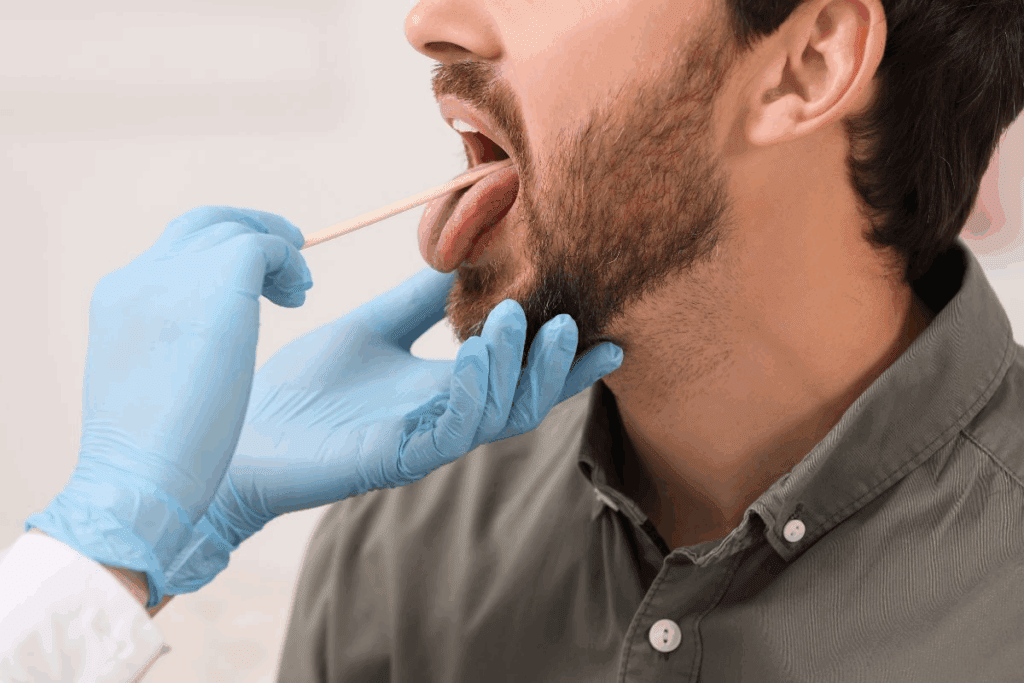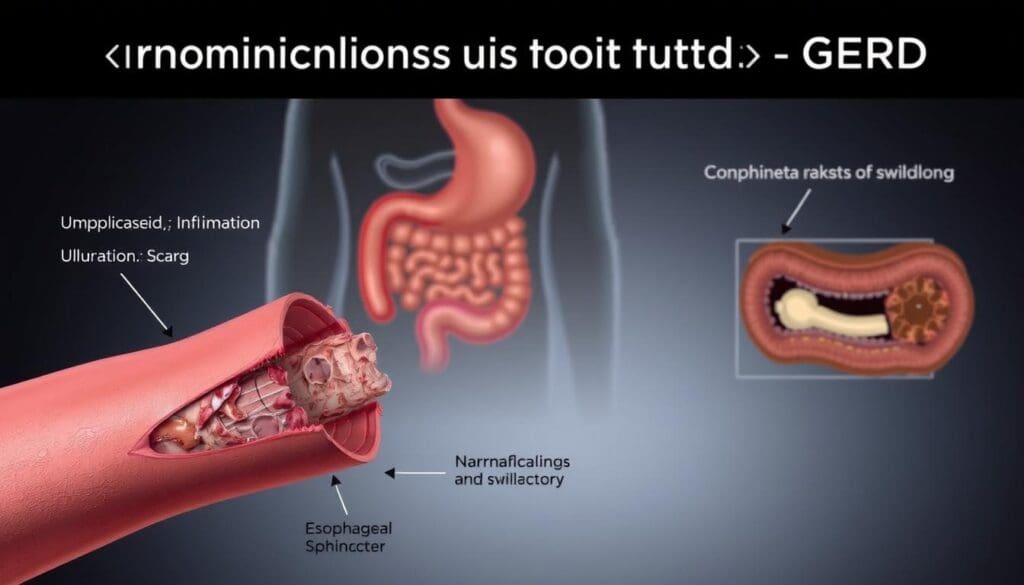Last Updated on October 31, 2025 by Saadet Demir

GERD, or Gastroesophageal Reflux Disease, affects millions globally. It often leads to trouble swallowing. Knowing how GERD impacts swallowing is key to managing it well. The connection between reflux and dysphagia: learn how GERD can lead to swallowing problems due to inflammation or stricture.
At our institution, we offer caring and cutting-edge treatments for GERD. Our goal is to help those struggling with this condition.
Gastroesophageal reflux disease (GERD) is a long-term condition that can really impact your life. It makes swallowing hard. When stomach acid goes back up into the esophagus, it can irritate and inflame it. This can cause the esophagus to narrow or even form a stricture.
This narrowing makes it hard for food to move down into the stomach. So, you might find it tough to swallow. This is called dysphagia.
GERD happens when the lower esophageal sphincter (LES) doesn’t work right. It lets stomach acid flow back up into the esophagus. This can cause heartburn, chest pain, and trouble swallowing.
If GERD isn’t treated, it can lead to more serious problems. These include esophagitis, stricture formation, and even Barrett’s esophagus.
The link between GERD and swallowing trouble comes from the damage acid reflux does to the esophagus. As the esophagus gets more inflamed and scarred, it can’t work right. You might feel like food is stuck in your throat or chest.
This makes swallowing uncomfortable or even painful.
GERD, or Gastroesophageal Reflux Disease, affects millions globally. It causes difficulty swallowing, or dysphagia, in many. About 24% of adults in the US have GERD symptoms.
GERD is common worldwide. In the US, over 20% of people have GERD symptoms.
Difficulty swallowing is a key GERD symptom. Stomach acid in the esophagus irritates and inflames it. This makes eating and drinking hard, and can cause malnutrition.
To manage GERD, lifestyle changes and treatments help. Avoiding trigger foods and taking antacids can ease symptoms. Sometimes, surgery is needed for underlying conditions.
Knowing about GERD helps people manage it. This improves their quality of life.
| Statistic | Value |
| Prevalence of GERD in the US | 20% |
| Percentage of GERD patients experiencing difficulty swallowing | 24% |

GERD can really affect a person’s life by making it hard to swallow. The upper esophageal sphincter (UES) and the esophagus are key in swallowing.
When the UES doesn’t work right, food can’t move smoothly into the esophagus. This makes swallowing hard.
Esophagitis, often caused by GERD, can make swallowing even tougher. It causes inflammation and irritation in the esophagus.
GERD can also mess with how the esophagus moves food. This disrupts normal movement and makes swallowing a challenge.
Esophageal strictures happen when acid stays in the esophagus too long. This causes the esophagus to narrow. It makes swallowing hard and uncomfortable.
GERD is a main cause of this problem. It happens when stomach acid goes back up into the esophagus. This can irritate the esophagus and lead to narrowing.
Stomach acid erodes the esophagus over time, causing scarring. This leads to difficulty swallowing and a feeling of food being stuck. These are common symptoms.
To treat esophageal strictures, doctors use dilation. This widens the esophagus. They use endoscopy to insert a balloon or dilator to stretch the area.

GERD-related dysphagia makes it hard to swallow, leads to food coming back up, and causes chest pain. If you notice these signs, getting medical help is key. This ensures there’s no hidden issue.
Common signs of GERD-related dysphagia include:
If you’re facing these symptoms, it’s vital to see a doctor. They can find out why and help you get better.
Diagnosing GERD requires a few steps. First, doctors do a clinical check-up. Then, they might use endoscopy or pH monitoring. These tests help find out if you have GERD.
Treatment for GERD includes making lifestyle changes. This means eating differently, losing weight, and avoiding things that make symptoms worse. Doctors might also prescribe medicines to lower stomach acid.
In some cases, surgery is needed. This is when symptoms are very bad or when complications happen. Getting diagnosed early and treated right can really help improve your life with GERD.
GERD, or gastroesophageal reflux disease, is a chronic condition. It can cause discomfort and make swallowing hard. Treatment often includes lifestyle changes, medications, and sometimes surgery.
Medications are key in managing GERD symptoms. Antacids, H2 blockers, and PPIs help reduce stomach acid.
Changing your lifestyle can also help. Avoiding certain foods, staying at a healthy weight, and raising your bed’s head can reduce symptoms.
Understanding GERD and making these changes can improve your life. It helps alleviate symptoms and enhances your quality of life.
GERD, or Gastroesophageal Reflux Disease, is a chronic condition that can significantly impact an individual’s quality of life. Effective management of GERD involves a combination of lifestyle modifications, dietary changes, and, in some cases, medical treatment.
Avoiding trigger foods is a key step in managing GERD. Common trigger foods include citrus fruits, tomatoes, and fatty or fried foods. Keeping a food diary can help identify which foods trigger symptoms.
Elevating the head of the bed by 6-8 inches can help prevent stomach acid from flowing up into the esophagus during sleep.
Techniques such as meditation, yoga, and deep breathing exercises can help reduce stress. Stress can make GERD symptoms worse.
By implementing these lifestyle changes, individuals with GERD can experience a significant reduction in their symptoms. This improves their overall quality of life.

Untreated GERD can cause serious problems. One is Barrett’s esophagus, where the lining of the esophagus changes. This can raise the risk of esophageal cancer. Getting medical help and making lifestyle changes can help avoid these risks.
It’s important to catch GERD early and treat it. If you’re showing signs of GERD, see a doctor. They can help find the best treatment for you.
If you’re having trouble swallowing or feel persistent discomfort, you should see a doctor. GERD, or Gastroesophageal Reflux Disease, happens when stomach acid flows back into the esophagus. This can irritate the esophagus and cause pain.
It’s important to know the warning signs. If you have severe trouble swallowing, chest pain, or vomit blood, get help right away.
Managing GERD means making lifestyle changes and sometimes taking medication. Working with your doctor can help ease symptoms and avoid serious problems.
Dealing with GERD-related swallowing problems needs a full plan. This includes making lifestyle changes, using medicine, and keeping an eye on how things go. With help from a doctor and these steps, people can feel better and live well.
By managing GERD, you can stay healthy and keep doing things you love. It’s all about finding ways to handle the symptoms and keep moving forward.
GERD is when stomach acid flows back into the esophagus. This causes heartburn and makes swallowing hard.
Symptoms include trouble swallowing and feeling like food is stuck. You might also regurgitate food.
Doctors use your medical history and physical exam to diagnose GERD. They might also do tests like endoscopy.
Acid reflux can cause inflammation and scarring in the esophagus. This can lead to dysphagia.
Managing GERD involves making lifestyle changes. This includes diet, position, and stress management. Medication and other treatments also help.
Untreated GERD can cause serious problems. These include esophageal stricture, Barrett’s esophagus, and a higher risk of esophageal cancer.
If you have persistent or severe symptoms, seek medical help. This includes trouble swallowing, chest pain, or vomiting blood.
Changing your diet and avoiding trigger foods can help. Losing weight and elevating your bed also helps.
Yes, surgery like fundoplication is available for GERD treatment.
GERD is a chronic condition, but symptoms can be managed. This is done through lifestyle changes, medication, and treatments.
National Center for Biotechnology Information. (2025). Why Does GERD Cause Difficulty Swallowing GERD or. Retrieved from https://pmc.ncbi.nlm.nih.gov/articles/PMC6970278/
Subscribe to our e-newsletter to stay informed about the latest innovations in the world of health and exclusive offers!
WhatsApp us